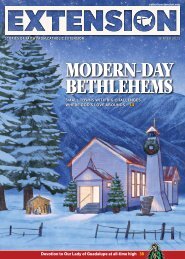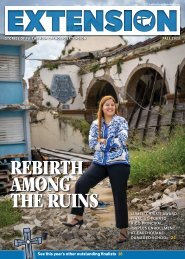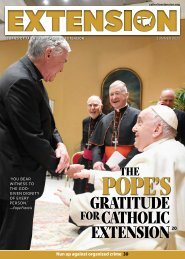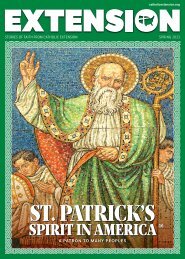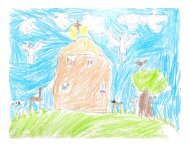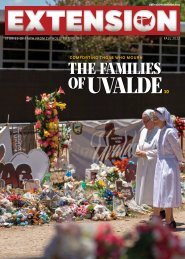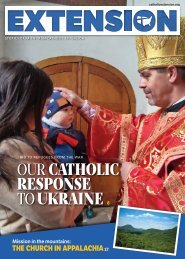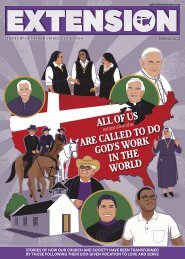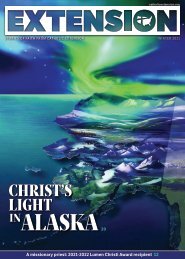Cardinal Michael Czerny, S.J., Message on Migrants
Many thanks to Cardinal Michael Czerny, S.J., the Holy See's Under-secretary for the Dicastery for Promoting Integral Human Development, for his presentation to the bishops of Extension-supported dioceses.
Many thanks to Cardinal Michael Czerny, S.J., the Holy See's Under-secretary for the Dicastery for Promoting Integral Human Development, for his presentation to the bishops of Extension-supported dioceses.
Create successful ePaper yourself
Turn your PDF publications into a flip-book with our unique Google optimized e-Paper software.
citizens with full rights, yet they are treated like foreigners in their own country. Racism<br />
is a virus that quickly mutates and, instead of disappearing, goes into hiding, and lurks in<br />
waiting. (FT 97)<br />
As applied by Pope Francis to society, to certain people and places within the territory of each<br />
diocese (or of the whole Church in a country), “periphery” describes a people’s c<strong>on</strong>diti<strong>on</strong> and<br />
indeed suffering, but also identifies what an individual Christian or Christian community can<br />
perceive, appreciate, and resp<strong>on</strong>d to.<br />
No <strong>on</strong>e is useless, in the words of Fratelli tutti, and no <strong>on</strong>e is expendable. Each of us, moreover,<br />
can learn something from others. This means finding ways to include those <strong>on</strong> the peripheries of<br />
life. “For they have another way of looking at things; they see aspects of reality that are invisible<br />
to the centers of power where weighty decisi<strong>on</strong>s are made”. To represent a society or a Diocese<br />
“where differences coexist, complementing, enriching and reciprocally illuminating <strong>on</strong>e another,<br />
even amid disagreements and reservati<strong>on</strong>s”, Pope Francis proposes the image of a polyhedr<strong>on</strong><br />
and a new culture of encounter. (cf FT 215).<br />
II. Not migrati<strong>on</strong> but migrants<br />
I would guess that migrati<strong>on</strong> is an element in the pers<strong>on</strong>al or family history of most of you, if not<br />
all. Perhaps like me, some of you were children when your family switched c<strong>on</strong>tinents or at least<br />
countries. And of course, American history is shaped by different types of migrants, from<br />
hopeful early settlement by English col<strong>on</strong>izers, through the devastating African slave trade, all<br />
the way to the presence of migrant workers from Central America and Mexico, the current<br />
desperate new arrivals from Afghanistan, and the c<strong>on</strong>stant, fully understandable pressure <strong>on</strong> the<br />
southern U.S. border. Al<strong>on</strong>g the way, migrants have greatly c<strong>on</strong>tributed to the face of the Church<br />
here. Think of the Irish escaping the potato famine in the mid-19th century. And the Italian influx<br />
was so significant that the Scalabrinian order (or the C<strong>on</strong>gregati<strong>on</strong> of the Missi<strong>on</strong>aries of Saint<br />
Charles Borromeo) was founded in 1887 to serve the Italian diaspora. Happily, I have Fr. Fabio<br />
Baggio, a Scalabrinian, as my co-Undersecretary for <strong>Migrants</strong> and Refugees.<br />
Let’s turn to what is going <strong>on</strong> right now. How shall we, particularly as Bishops, regard the<br />
vulnerable people <strong>on</strong> the move within American diocesan territories? Their movement can take<br />
place in different directi<strong>on</strong>s: arriving and in transit; staying permanently or departing for good,<br />
perhaps to return to a previous homeland; or seas<strong>on</strong>al comings-and-goings. In your Diocese you<br />
can have several of these situati<strong>on</strong>s at the same time, or even all of them. I menti<strong>on</strong> this to<br />
suggest that, to begin taking hold of this pastoral challenge, the first thing we need is help to<br />
perceive accurately what is going <strong>on</strong>; or, in other words, to research, as in “searching for the lost<br />
sheep”.<br />
3




